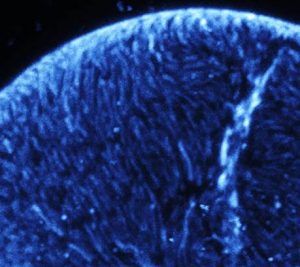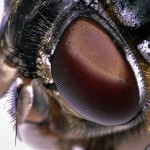

Diabetes is the leading cause of kidney failure in the UK. In collaboration with the University of Bristol, BU is in receipt of (another) three year grant that ultimately, we hope, will lead to the discovery of new treatments to prevent kidney failure developing in patients with diabetes.
The work, using patient data and BU’s Drosophila (fruit fly) kidney model, will look at how preventing the disruption of energy within kidney filtration cells called podocytes might slow or prevent kidney failure. The image shows the surface of a podocyte-like cell within a fruit fly, with linear arrays of filtration slits covering its surface. These minute structures are common to both human and fly cells and become damaged when energy is depleted in the cells – leading to loss of cell function. Flies allows us to understand the molecular basis of how this leads to kidney failure in humans – and guides us as to which molecules to target in the patients.
Dr. Paul S. Hartley.
 Strong Presence of BU at UK Kidney Week
Strong Presence of BU at UK Kidney Week










 Beyond Academia: Exploring Career Options for Early Career Researchers – Online Workshop
Beyond Academia: Exploring Career Options for Early Career Researchers – Online Workshop UKCGE Recognised Research Supervision Programme: Deadline Approaching
UKCGE Recognised Research Supervision Programme: Deadline Approaching SPROUT: From Sustainable Research to Sustainable Research Lives
SPROUT: From Sustainable Research to Sustainable Research Lives BRIAN upgrade and new look
BRIAN upgrade and new look Seeing the fruits of your labour in Bangladesh
Seeing the fruits of your labour in Bangladesh ECR Funding Open Call: Research Culture & Community Grant – Apply now
ECR Funding Open Call: Research Culture & Community Grant – Apply now ECR Funding Open Call: Research Culture & Community Grant – Application Deadline Friday 12 December
ECR Funding Open Call: Research Culture & Community Grant – Application Deadline Friday 12 December MSCA Postdoctoral Fellowships 2025 Call
MSCA Postdoctoral Fellowships 2025 Call ERC Advanced Grant 2025 Webinar
ERC Advanced Grant 2025 Webinar Update on UKRO services
Update on UKRO services European research project exploring use of ‘virtual twins’ to better manage metabolic associated fatty liver disease
European research project exploring use of ‘virtual twins’ to better manage metabolic associated fatty liver disease